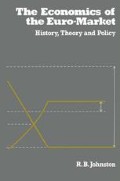Abstract
Hitherto the analysis has been preoccupied with explaining the parameters and responses by agents which affect the operations of the Euro-currency system, and little has been said about the implications of the system for the rest of the world. Chapter 6 examined some of the beneficial consequences (and costs) of credit intermediation by the market for the world economy. In fact, ever since the Euro-market emerged there has been considerable debate about its impact on world economic stability. The concerns raised in this debate derive largely from the following observations:
-
1.
The market is not subject to direct regulation for monetary control purposes.
-
2.
The institutions involved in the market are mainly branches and subsidiaries of banks. In their own domestic markets banks are normally regulated for monetary control purposes and are re-garded as playing an especially important role in national monetary systems.
-
3.
The rather visible and efficient nature of the Euro-market as a channel for international capital and banking flows.
Preview
Unable to display preview. Download preview PDF.
Copyright information
© 1983 R. B. Johnston
About this chapter
Cite this chapter
Johnston, R.B. (1983). Macroeconomic Concerns. In: The Economics of the Euro-Market. Palgrave, London. https://doi.org/10.1007/978-1-349-86050-0_8
Download citation
DOI: https://doi.org/10.1007/978-1-349-86050-0_8
Publisher Name: Palgrave, London
Print ISBN: 978-0-333-33419-5
Online ISBN: 978-1-349-86050-0
eBook Packages: Palgrave Economics & Finance CollectionEconomics and Finance (R0)

